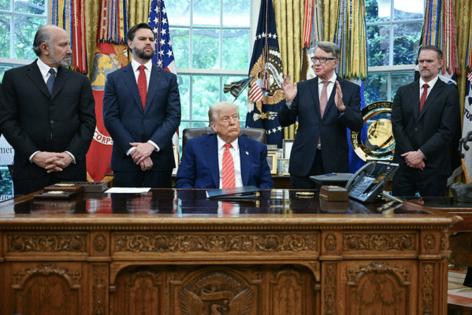US consumer confidence jumps most in four years on trade truce
Published in Business News
U.S. consumer confidence rebounded sharply in May from a near five-year low as the outlook for the economy and labor market improved amid a truce on tariffs.
The Conference Board’s gauge of confidence increased by 12.3 points to 98, marking the biggest monthly gain in four years. The figure exceeded all estimates in a Bloomberg survey of economists.
A gauge of consumer expectations for the next six months surged by the most since 2011, while a measure of present conditions climbed as well, data released Tuesday showed. The improvement in confidence was broad across age and income groups as well as political affiliations, with the strongest gains among Republicans.
The cutoff for the survey was May 19, after the U.S. and China agreed to temporarily reduce high levies on each other’s goods while they negotiate a trade deal. About half the responses were collected after the agreement was reached on May 12, according to a statement.
“The rebound was already visible before the May 12 U.S.-China trade deal but gained momentum afterwards,” Stephanie Guichard, senior economist at The Conference Board, said in the statement.
The gauge’s improvement may be an indication that worries about tariffs — a key source of anxiety in the previous surveys — abated in recent weeks. However, President Donald Trump has since renewed threats to increase levies on other countries and products.
Consumers’ outlook for the stock market improved in the survey, coinciding with a 5.8% gain in the S&P 500 so far this month.
“The book is far from closed on tariffs, as we saw over the past few days with the threat of 50% tariffs for the EU, but financial markets seem ready to move past it, and these numbers suggest that households may be moving in that direction as well,” Stephen Stanley, chief economist at Santander U.S. Capital Markets, said in a note.
Upbeat outlook
Consumers were more upbeat about the outlook for business conditions, the job market and their incomes. As a result, larger shares of consumers said they plan to buy cars, homes and major appliances as well as take vacations over the coming six months.
Views of the present job market were more mixed, however. While more respondents said jobs were plentiful in May, there was also a larger share that said jobs were currently hard to get. The difference between these two — a metric closely followed by economists to gauge the job market — narrowed for a fifth month.
Despite widespread apprehension among consumers and companies alike, the economy at large and the job market in particular have held up fairly well. Tariffs will probably take months to make their way through the economy, forecasters say, and consumers have so far been shielded from the brunt of the impact by retailers absorbing much of the higher costs.
Still, companies have warned they plan to raise prices, chief among them Walmart Inc. The world’s largest retailer said last week that it will increase prices after working its way through inventory.
The median measure of consumer inflation expectations fell by the most since mid-2022, in the Conference Board’s report. Some consumers mentioned lower gas prices in write-in responses.
(With assistance from Cécile Daurat.)
©2025 Bloomberg L.P. Visit bloomberg.com. Distributed by Tribune Content Agency, LLC.












Comments